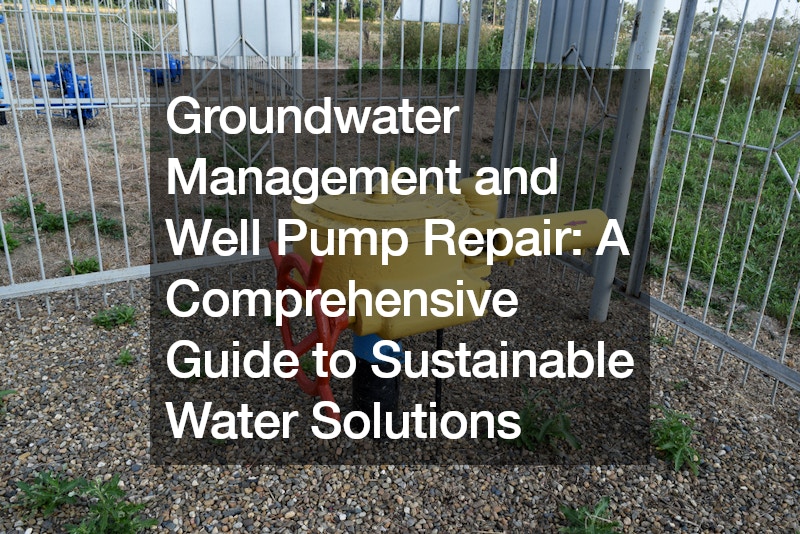In rural and remote areas of the United States, private wells are a vital source of clean drinking water. However, well water is a precious resource that requires responsible management and proper well maintenance to ensure its sustainability for future generations. This comprehensive guide explores the science behind groundwater management, the importance of well pump repair, and practical strategies for safeguarding this essential resource.
1. Understanding Groundwater: A Hidden Treasure
Groundwater is the invisible treasure beneath our feet. It fills the cracks and pores within rock and soil formations, acting as a vast underground reservoir.
Rainwater and surface water percolate through the ground, replenishing these aquifers, which are crucial for various purposes:
Drinking Water Source: Millions of Americans rely on groundwater for daily drinking water needs. Wells tap into these aquifers, drawing water for individual households or small communities. Agriculture: Groundwater irrigation is essential for agricultural production, sustaining farms, and ensuring food security. Ecosystem Health: Groundwater is vital in maintaining healthy ecosystems, supporting wetlands, and providing baseflow for streams and rivers. 2. The Threat of Overuse: Managing Groundwater Sustainability
While groundwater seems like an endless resource, it’s not. Excessive pumping can lead to several challenges:
Water Table Decline: As water is withdrawn faster than it can be replenished, the water table (the upper surface of the groundwater) can decline. This can lead to deeper well drilling, increased pumping costs, and potentially reduced well yields. Water Quality Issues: Overpumping can draw saltwater intrusion into coastal aquifers, or pull contaminants from deeper layers of the ground, compromising water quality. Environmental Impacts: Decreased groundwater levels can impact ecosystems, reduce stream flow, and affect plant and animal life. 3. The Role of Well Pumps: Delivering Water, Ensuring Sustainability
Well pumps are the workhorses of private well systems, lifting groundwater from the aquifer to your home. Understanding different well pump types is crucial:
Submersible Pumps: These pumps reside within the well, directly submerged in the water. They are efficient for deep wells and offer quiet operation. Jet Pumps: Located above ground, jet pumps use compressed air to lift water from shallow wells. They are a cost-effective option but may be noisier than submersible pumps. Solar-Powered Well Pumps: Harnessing renewable energy, these pumps offer an eco-friendly and sustainable solution, particularly in remote areas with limited access to grid electricity. 4. Well Pump Repair: Maintaining the Flow of Life
Regular well pump maintenance is essential for a sustainable water supply. Here’s why prompt well pump repair is crucial:
Reduced Water Flow: A failing pump will struggle to deliver water at its usual pressure and flow rate. This can lead to inconvenient low water pressure in your home. Increased Energy Consumption: A malfunctioning pump may have to work harder to deliver water, leading to higher energy bills. Complete Pump Failure: Ignoring well pump issues can result in a complete pump breakdown, leaving you without water until repairs are made. 5. Signs Your Well Pump Needs Attention
Being proactive is key. Here are some signs that your well pump might need attention:
Sputtering Faucets: Air bubbles in your water or faucets sputtering when turned on can indicate a failing pump or pressure problems. Low Water Pressure: A noticeable decrease in water pressure throughout your home is a red flag that your well pump might be struggling. Running Cycles: Frequent on-and-off cycles of your pump can indicate inefficiencies or potential problems with the pressure switch. Unusual Noises: Grinding, knocking, or other unusual noises emanating from your well pump can signify internal wear and tear. 6. Strategies for Sustainable Groundwater Management
Here are some key practices to promote responsible groundwater use:
Water Conservation: Implementing water-saving measures in your home, such as fixing leaky faucets and installing low-flow fixtures, reduces overall water demand. Monitoring Water Use: Track your water usage to identify areas for improvement and identify any potential leaks in your well system. Rainwater Harvesting: Collecting rainwater for non-potable purposes, such as irrigation, reduces reliance on groundwater for these tasks. Well Maintenance: Schedule regular well inspections and well pump maintenance to ensure optimal performance and longevity. 7. The Future of Well Systems: Innovation and Sustainability
Technology is playing an increasingly important role in well system management: Smart Well Monitoring Systems: These systems use sensors to monitor water levels, pump performance, and water quality in real-time. This data empowers homeowners to optimize water use, detect potential issues early on, and promote proactive well maintenance. Variable Speed Drives: These devices adjust the pump’s speed based on demand, reducing energy consumption and wear and tear on the pump motor. Advanced Well Pump Materials: Research and development are leading to the creation of more durable and energy-efficient well pump components, further enhancing sustainability. 8. Seeking Professional Help: Well Drillers and Pump Repair Specialists
For complex well system issues or new well installations, consider consulting qualified professionals:
Certified Well Drillers: Licensed well drillers possess the expertise and equipment to safely and effectively drill new wells, ensuring proper construction and adherence to local regulations. Pump Repair Specialists: These professionals diagnose and repair well pump problems, ensuring your system functions optimally and delivers a reliable water supply. 9. Conclusion: Safeguarding Our Water Future, One Well at a Time
Groundwater is a shared resource, vital for human and environmental well-being. By adopting sustainable practices, employing water-saving technologies, and maintaining your well system, you can play a crucial role in safeguarding this precious resource for future generations. Remember, a well-maintained well pump is not just about keeping the water flowing in your home, but also about contributing to the collective effort towards responsible groundwater management.
.


